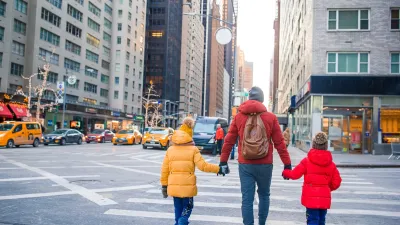Recent studies on older generations' dwelling and travel patterns show that urban areas may provide more mobility and independence than suburban areas with less access to public transit.
As the "silver tsunami" of Baby Boomers facing retirement begins to break, those born between 1946 and 1964 are starting to face the question of where to spend their golden years. Baby Boomers pride themselves for their generation's independent spirit, and they would prefer to maintain this status into old age. Marlys Harris writes that "boomers are adamant that they do not want to live the way elderly people have in the past. That was the message from John McIlwain, senior fellow at the Urban Land Institute in Washington, D.C. 'They think that they are different,' he said. 'They feel that they are entering a second stage of adulthood.'"
So far, studies have shown that boomers prefer to live in the comfort of suburban areas. "A 2009 MetLife Foundation study found that 62 percent of people aged 55 and over say they plan to stay in suburbia." However, Harris claims, moving to urban areas may prove more beneficial for seniors due to easier access to a variety of transit options.
Harris goes on to say that other studies have found that "people over age 65 who no longer drive make 15 percent fewer trips to the doctor, 59 percent fewer trips to shop or eat out and 65 percent fewer trips to socialize. Unable to get around, to buy groceries, make medical appointments, visit the bank and so on, boomers will, like it or not, be forced to move into that nursing home." In other words, giving up a home and a car in suburbia may not seem so bad compared to the alternative. Harris points out that public transit poses its own set of issues for the aging population, but it's a helpful factor to consider when the boomers begin sifting through the choices for where to spend the next chapter of their lives.
FULL STORY: What's Better for Old People: City or Suburb?

Alabama: Trump Terminates Settlements for Black Communities Harmed By Raw Sewage
Trump deemed the landmark civil rights agreement “illegal DEI and environmental justice policy.”

Study: Maui’s Plan to Convert Vacation Rentals to Long-Term Housing Could Cause Nearly $1 Billion Economic Loss
The plan would reduce visitor accommodation by 25% resulting in 1,900 jobs lost.

Planetizen Federal Action Tracker
A weekly monitor of how Trump’s orders and actions are impacting planners and planning in America.

Waymo Gets Permission to Map SF’s Market Street
If allowed to operate on the traffic-restricted street, Waymo’s autonomous taxis would have a leg up over ride-hailing competitors — and counter the city’s efforts to grow bike and pedestrian on the thoroughfare.

Parklet Symposium Highlights the Success of Shared Spaces
Parklets got a boost during the Covid-19 pandemic, when the concept was translated to outdoor dining programs that offered restaurants a lifeline during the shutdown.

Federal Homelessness Agency Places Entire Staff on Leave
The U.S. Interagency Council on Homelessness is the only federal agency dedicated to preventing and ending homelessness.
Urban Design for Planners 1: Software Tools
This six-course series explores essential urban design concepts using open source software and equips planners with the tools they need to participate fully in the urban design process.
Planning for Universal Design
Learn the tools for implementing Universal Design in planning regulations.
Caltrans
Smith Gee Studio
Institute for Housing and Urban Development Studies (IHS)
City of Grandview
Harvard GSD Executive Education
Toledo-Lucas County Plan Commissions
Salt Lake City
NYU Wagner Graduate School of Public Service





























